Bolívar, the apostle of President Petro
EL PAÍS spent a day following the campaign of the author and senator, who is seeking to become the next mayor of Bogotá. Famous for his narco novels and scripts, one of his best-known works is ‘Without Breasts There Is No Paradise’
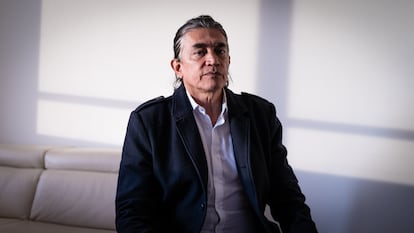

The city of Bogotá appears through the windows of the SUV. A weak light illuminates the buildings, funeral homes and churches. Gustavo Bolívar — a 58-year-old man with defined features, thick lips and a ponytail that gives him a youthful appearance— is sitting in the back seat, half-dozing. The staffer sitting next to him brings him up to date, telling him that he’ll be speaking at his closing rally in the night, after his followers have been listening to different bands for five hours.
“That’s very strange,” Bolívar says, suddenly waking up.
“So what would you like to do?”
A flock of birds flies away from the trees at the sound of a horn.
“Change it. I’m not Jesus Christ or [Gustavo] Petro. People shouldn’t have to wait for me for so many hours.”
Of course, he’s not God or the president, but fame hasn’t exactly eluded Bolívar. In fact, it’s surely what has brought him here, to the inside of this vehicle.
Nearly two decades ago, he wrote a book and adapted it for a television series, which became a huge success: Without Breasts, There is No Paradise. He became a wealthy man and went to live in Miami, where he owns property and a boat. The next thing he wanted to do was move to Los Angeles and try his luck in Hollywood. But fate had other things in store for him. President Gustavo Petro — who took power just over a year ago — asked him to be his coalition’s candidate for the mayor of Bogotá. And that’s why he’s been campaigning for 14 hours every day, in the lead-up to the October 29 municipal elections. Bolívar declares himself to be an apostle of the president — he’s embarked on this crusade out of love for a cause.
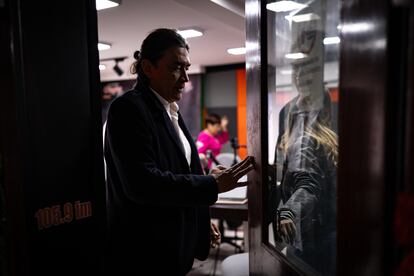
“I’m pissed off, let’s get this over with.” He says this right before he sits down in front of the microphone in the studio of Olímpica, a popular radio station with 1.4 million listeners from the poorest strata of Bogotá. There are already Christmas decorations up.
— “We’re a very violent city, we have a lot of mental patients,” the announcer tells him.
— “Not only [do we have] a mental illness epidemic, we also have a lot of suicides,” the candidate responds.
— “How many gray hairs have you gotten since you started running?”
— “Double [than what I had before]. I’ve also lost weight. During the campaign, you don’t get a chance to eat much.”
After the light banter, Bolívar takes the opportunity to sneak in his pitch.
— “There are no longer politicians from the left, right, or center. There are only decent politicians or corrupt politicians.”
The broadcast ends and the candidate quickly leaves and gets into this SUV.
He was born in the town of Girardot, in the center of Colombia, in 1965. His mother was a housewife and his father was an army pharmacist. His dad — a drinker — died of cirrhosis when Gustavo was only 10-years-old. Without any support, his mother moved to Bogotá with her six children in tow. At the age of 13, Gustavo sold pirated soccer team caps and t-shirts outside stadiums. And, in the nights, he wrote by instinct, encouraged by an inner fire of mysterious origins. Growing up, there were no books in his house.
Bolívar married young, at the age of 18. He and his wife had two children in quick succession, Óscar and Susana. He enrolled in a journalism degree, but had to leave university because he couldn’t afford the tuition. “He’s not going to tell you, because he’s very proud, but he would often go hungry,” says John Jairo Hoyos — a friend of Gustavo’s from that time — in a phone call with EL PAÍS.
Bolívar is in the car, making online transfers with his banking application. Those who know him say that he’s shy. It shows in his public appearances, where he sometimes appears abrupt or moody. In reality, it’s a veil of modesty that he deploys in situations where he feels overly exposed. He wears a serious expression on almost all the campaign posters that cover Bogotá these days. Experts in political communications have told him to relax, to smile. But he clings to his inner self. In private, however, he’s a joker, imitating the voices of various characters, telling one anecdote after another. Without the veil of seriousness, he seems like a different person.
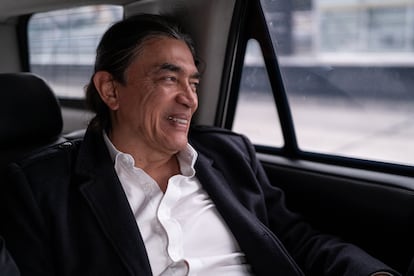
He’s now heading to a candidates’ debate at the National University of Colombia. Since he arrives 20 minutes early, he decides to kill some time in a modest coffee shop.
Sitting at a wooden table, facing the door, he leafs through the menu and orders something called a tetero, which is water with panela (unrefined whole cane sugar), something that he used to drink in his childhood. A muted television plays in the back of the café, showing Javier Bardem. The resemblance between Bolívar and the actor is evident. He also somewhat resembles Will Sampson, who plays Chief Bromden in the film One Flew Over the Cuckoo’s Nest. “One day, in New York, they confused me with Benicio del Toro,” he adds.
“I set the standard that you have to plant a tree, have a child and write a book before you turn 20,” he jokes, from the back seat of the SUV. Out the window, you can see an aqueduct, a convention center and an advertising billboard, revealing the jumbled-up nature of the city.
The phone rings.
“Hola papi,” Bolívar responds affectionately. On the other end of the line is his youngest son, from his second marriage. He informs his father that the boat in Miami has broken down, he needs money to fix it. His dad makes an e-transfer and tells him: “Quickly, grab the hose and wash that boat until the last grain of salt comes out.”
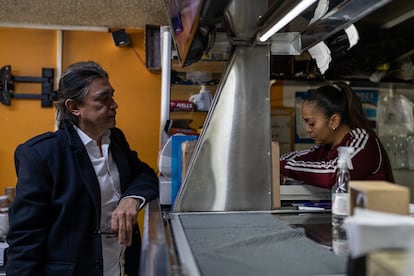
At 22, Bolívar got divorced. To pay for his young family’s expenses, he sold figurines of Baby Jesus at the door of a church and, door-to-door, he hawked books, showerheads and alarm systems. However, the poison of politics soon caught up with him. He enthusiastically joined the New Liberalism movement, which was established by Luis Carlos Galán, a politician who was murdered on August 18, 1989, while campaigning for the presidency.
Bolívar was in the crowd when the shots rang out. And Galán’s son — Carlos Fernando — is his main competitor in the mayoral elections.
In the New Liberalism movement, he met Enrique Parejo González, who was briefly minister of justice and was running for the Bogotá City Council. He asked Bolívar to be his assistant. At that time — when fortune had not yet tapped his shoulder — he was a 23-year-old boy who had short hair and wore cheap suits. “Parejo was very respectable. I wouldn’t have allowed anyone on his team to wear jeans or have long hair,” recalls Maritza Gutiérrez, one of the people who knows Bolívar best. She now serves as his campaign manager.
Bolívar wrote speeches for his boss. There was a general consensus that he was the best writer on the team. Former staffers describe him as someone who wasn’t a partier, but rather, as someone who was always in love. He had three or four girlfriends in a short period of time.
Things got more interesting when his boss ran for president and he worked on the campaign. Parejo didn’ do very well as a candidate, however: he came third. But in order not to leave his young supporters unemployed, he took them to work at his house.
Bolívar and Maritza were his closest assistants. “Gustavo didn’t even have enough money to pay the bills,” she recalls. He used to take the cheapest bus to get around the city. The adventure lasted just over a year. Bolívar and Maritza then ended up in a small company called Prolam Informática. He was a graphic designer, but he quickly grew bored and frustrated with the work. After six months, he quit and started writing books. He started to carve out a niche for himself with works such as Gangs, War and Peace — a novel about a group of young people in a marginal neighborhood, which was later adapted to television. With his earnings, he bought a blue Renault 12 and stopped riding the bus. Maritza remembers that he asked her: “what do I do with so much money?”
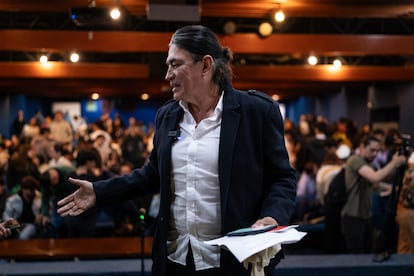
The auditorium of the National University — where the debate is going to be held — is full of young people in their twenties. Bolívar faces Rodrigo Lara — the son of another New Liberalism politician who was murdered in the 1980s — and Juan Daniel Oviedo, a cool and friendly guy who puts the students at ease. Galán hasn’t bothered to show up.
The polls put Galán first by far. According to the surveys, he’s close to winning in the first round, which requires getting more than 40% of the vote and being at least 10 points ahead of the second-place finisher. Bolívar, however, thinks that the big media outlets are manipulating the figures to create a climate of victory around Galán: “They’re telling lies and putting someone on the victory bus with impunity.” He then begins his usual repertoire from the podium: subsidies for disadvantaged young people, regulating drugs and ending prohibition, defending the rights of protestors and so on.
Then comes the Q & A session with the students. The topics are quite specific: the candidates are asked about a polluted river, a pedestrian crossing, a park.
“Are you afraid of death?” someone asks Bolívar.
“I’ve lived with risks since I started speaking up,” he replies. “In 1998, I published a book about the murder of a young woman in the apartment of a popular star — Diomedes Díaz — and he had to go take refuge with the paramilitaries [to escape justice]. I received lots of threats, because the book practically sentenced him. Later, I received threats when I wrote the essay, This is how elections are stolen in Colombia. [I mentioned] how some of the candidates were paramilitaries. All of this has led me to believe that I don’t have an easy life… the people I’ve messed with are dangerous and, at any moment, they can do something to me.”.
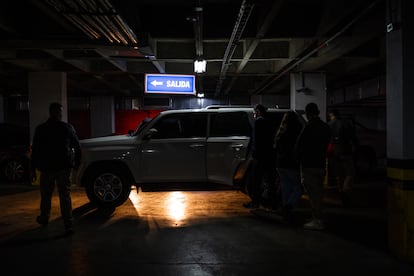
In 2018, Bolívar was elected to the Senate of Colombia as a member of the political party that Gustavo Petro created, Colombia Humana (“Humane Colombia”). They met five years before that, in 2013, when Petro was removed from his office as the mayor of Bogotá due to a garbage contracting issue. Years later, the Inter-American Commission on Human Rights would absolve him.
At the time, Bolívar — who saw Petro’s removal as an attack on democracy — sent a message on Twitter to the mayor, whom he had never met in person:
“Tocayo (the word used in Spanish when someone shares the same name as you), this is some terrible shit. My complete solidarity with you. And a selfless offer: I don’t know how your finances are, but if you need something, I can gladly give you 10 million [pesos] at this time (about $2,500). I know it’s not much, but I’m interested in you being able to continue to share your ideas. If you accept it, tell me where I can send it. A big hug.”
Petro answered half-an-hour later: “Thank you, Gustavo. For now, I will manage. We’ll see how things go later.” A year after this online interaction, the moment came. Petro’s assistant — Hilda Carrera — went to look for Bolívar, informing him that the former Bogotá mayor needed money to collect signatures, as he was running for the presidency. The author contributed. Shortly afterwards, Petro encouraged him to run as a senator in the 2018 elections, as part of his coalition.
At first, Bolívar didn’t think this was a good idea. He lived a good life in Miami. Why complicate things? However, Petro ended up convincing him, even though he had contracts to write three television series. And that’s how his life changed overnight.
— “Can you imagine yourself as president of Colombia?”
— “When I started doing national tours, people saw me as a successor to Petro. But I lost the desire.”
— “Why?”
— “It’s very difficult. Not because I don’t have the guts to do it, but because I don’t want to sacrifice my family. Family is worth more to me. That is, unless conditions change in the near future and I can do it. I need to prepare myself more. I don’t see it on the horizon.”
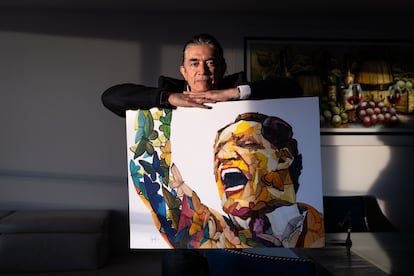
His campaign team has prepared the next event in a shopping center with crystalline floors. A group of very enthusiastic retired teachers are waiting for him, in an office on the second floor, seated in plastic chairs. Bolívar sits at a long table, facing the audience, with a man on each side. The one on the right grabs the microphone and gives a 15-minute-long speech that puts the audience to sleep. Bolívar is distracted, looking at his cell phone. Just when it seems that his turn has arrived, the microphone falls into the hands of the man on the left, who also doesn’t skimp on time and talks for another quarter-of-an-hour. The atmosphere becomes dull.
And then suddenly, when the candidate speaks, the room is electrified again. He says that his main opponent isn’t telling the truth — “whoever comes to power by lying, governs by lying” — and that he is being defamed when people claim that he has said he will pay youngsters a million pesos not to kill. Insecurity, he continues, exists in the city because there is hunger, poor education, a lack of opportunities and broken homes. He plans to establish bilingualism in public schools, so that English isn’t just a privilege of the rich. At one point, he appeals to Petro’s base: “For change to occur, there must be a Gustavo in the mayor’s office and a Gustavo in the presidency.”
The teachers applaud him. As they start rushing to grab a coffee from the table in the corner, he calls out to them, with one more thing to say: “I’m bad at asking for votes. Do what you have to do.”
Bolívar wasn’t comfortable as a senator. Many of the other parties detested him. He asked his colleagues to lower their salaries. He then said that half of the members of Congress had reached public office by buying votes, while the other half didn’t work or show up to the plenary sessions. He never greeted former President Álvaro Uribe in the hallway — he accuses him of causing many of the country’s ills.
The author’s enemies believe that he’s a populist, who reduces the world to good and evil (and he, of course, is on the good side). In other words: he bathes in the waters of purity. In a speech that went viral, he said that Congress was “a nest of rats.” He was fired up when he made that statement, gesturing with his hands, raising his voice. On the way out, he was about to come to blows with right-wing Senator Antonio Zabaraín.
Bolívar’s phone rings again. The name of Vicky Dávila — the director of Semana magazine — appears on the screen. She wants to organize another debate with all the candidates. He refuses to go, because the magazine criticizes him a lot. He believes that they support his adversaries. “Molano — the candidate [for Uribe’s bloc] — says one thing against me and, for a week, it’s making the headlines,” he complains. Dávila will call again 11 times, according to Bolívar. He will look at his cell phone out of the corner of his eye and put it on silent, because he’s familiar with the journalist’s persuasive capacity. “If I answer her, she’ll convince me.”
He lives in the north of the city, but he also has an apartment downtown, on the 22nd floor of a brutalist building. He rests there in the middle of the long days of the campaign. Early this morning — before heading to the radio station — he sat down to write a script for a series that was previously agreed-upon with Telemundo. God knows how it will end up being completed if he becomes the mayor.
The living room is divided into two spaces, with an open-concept kitchen. On the shelves, there is an archangel and, on a coffee table, a cast iron gun with butterflies coming out of the barrel. At the beginning of the main hallway, there’s a desk and, behind it, two bedrooms. One of them has a balcony, from which you can see the entire city. This afternoon, the sky is lit up just behind the hills, at the end of the plain. This is where the candidate records many of the videos that he then uploads to social media.
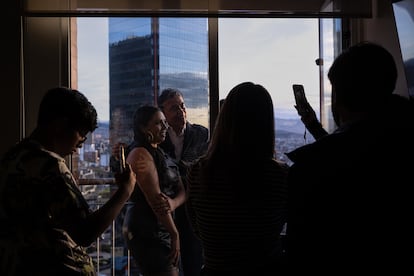
In the lobby of the building, his eight bodyguards and the two police officers who accompany him everywhere are waiting for him. After a quick rest, it’s now time to go to a meeting with activists in the east of the city.
— “Have you ever had a midlife crisis?”
— “I’m a weirdo, I’ve never had a crisis of any kind,” he shrugs. “I never get stressed. Right now, everyone is nervous because election day is approaching (October 29), but I’m not worried.”
— “What’s sudden fame like?”
— “At first, it’s cool. But then, it’s not. You lose your privacy. I’ve never been able to mention that I have a girlfriend (he’s single at the moment) or post a photo holding hands with [a partner]. In an instant, in this violent country, they can ruin your life.”
— “What kind of writer are you?”
— “I’m halfway where I want to be. I’ve been successful because I’m creative – I get the themes, the titles and the strategy right. But in terms of being considered a world-renowned writer, I’m lacking.”
— “You’ve cultivated the narco genre.”
— “It’s called that disparagingly. I like the term ‘tragic realism’ more. But they call me the father of the narco genre.”
— “Some critics haven’t taken you seriously, because you address what’s popular.”
— “I’ve written all kinds of books,” he notes. It’s clear that this is a topic which he doesn’t care to expand on.
— “Some of the other candidates are children of well-known politicians, from aristocratic families. Your background is more modest.”
— “If you look at the opposition to Petro, there are seven presidential families: Uribe, Pastrana, Lleras, Valencia, Gaviria, Turbay... the seven families that led Colombia to failure are Petro’s opposition. They’re the ones who oppose the reforms, because they affect very powerful interests… especially the economic groups that have done big business in this country thanks to [political] favors. Dismantling all of that has a price.”
— “What will happen if you lose?”
— “It wouldn’t be traumatic for me. I would continue my life as if nothing had happened.”
We arrive at a garage, where about 40 people are waiting for him. A man gives him a book — The Miracles of Plants — and asks him to read it before the elections (as if he has time to spare). Another person tries to reach the candidate, but fails. He settles for talking to one of the staffers. Bolívar stands in front of a wall, next to a punching bag. He speaks for 15 minutes and, when he leaves, the small crowd shouts: “Bolívar for mayor!”
Outside, night has fallen. The candidate returns to the SUV. Now, he really looks tired. He covers his eyes with his hand. The staffer gives him a sheet of paper written by the man who tried to speak with him. His name is René Latorre: he sells “paradigms of change.” René writes that he has been trying to contact Bolívar for three years without success.
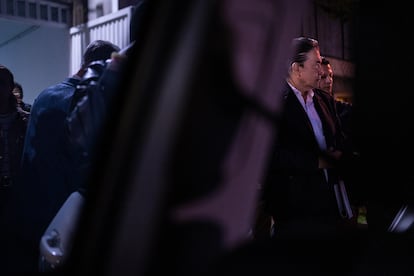
“The guy begged me to give it to you. Why don’t you record something for him?”
Bolívar holds his cell phone up to his mouth and sends the man an audio on WhatsApp: “As soon as I get home, I’ll check out [what you wrote].Thank you for the contribution. It’s a shame we couldn’t greet each other in person. Sending you a big hug.”
The tires slide on the wet asphalt. The Colombian national anthem plays on the radio, a sign that it’s six o’clock in the afternoon.
— “Where are we going now?” Bolívar asks.
— “An event with the Democratic Pole,” the staffer replies, referring to a small left-wing party.
Bolívar makes a face.
The SUV winds through the narrow streets of the downtown. We pass an ambulance, a police patrol, street vendors, people sheltering from the rain, homeless people sleeping on cardboard.
We park next to an auditorium where more than 500 people are waiting for the candidate. Pacho Maltés – his political coordinator – hops into the passenger seat.
— “It’s full, brother,” Maltés tells him.
— “But all of these people are already going to vote for me. I should be out in the streets,” Bolívar sighs tiredly.
— “It’s the base. You have to motivate them. Ready?”
— “Let’s go.”.
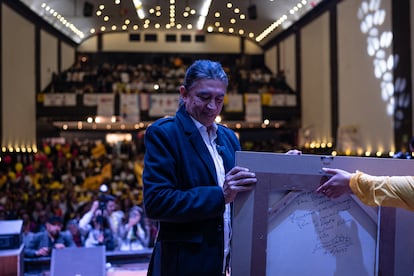
Sign up for our weekly newsletter to get more English-language news coverage from EL PAÍS USA Edition
Tu suscripción se está usando en otro dispositivo
¿Quieres añadir otro usuario a tu suscripción?
Si continúas leyendo en este dispositivo, no se podrá leer en el otro.
FlechaTu suscripción se está usando en otro dispositivo y solo puedes acceder a EL PAÍS desde un dispositivo a la vez.
Si quieres compartir tu cuenta, cambia tu suscripción a la modalidad Premium, así podrás añadir otro usuario. Cada uno accederá con su propia cuenta de email, lo que os permitirá personalizar vuestra experiencia en EL PAÍS.
¿Tienes una suscripción de empresa? Accede aquí para contratar más cuentas.
En el caso de no saber quién está usando tu cuenta, te recomendamos cambiar tu contraseña aquí.
Si decides continuar compartiendo tu cuenta, este mensaje se mostrará en tu dispositivo y en el de la otra persona que está usando tu cuenta de forma indefinida, afectando a tu experiencia de lectura. Puedes consultar aquí los términos y condiciones de la suscripción digital.








































